|
Social media has been gaining momentum in the Catholic world since the mid-2010s; however, since the COVID-19 pandemic began, digital evangelization and virtual faith-sharing have become even more important and prevalent. Because in-person liturgies, retreats, and daily interactions were not possible, Church organizations across the U.S. began to increase their digital footprint. Although the Catholic Apostolate Center has used technology and social media as tools for evangelization since its inception in 2011, the COVID-19 pandemic also led the Center to a greater focus on digital evangelization and online formation tools. As an intern with the Catholic Apostolate Center, my time has been punctuated by helping people encounter the Church and faith formation more positively. Specifically, expanding the Center’s courses on Catholic Faith Technologies’ e-learning platform and building an app for the Immaculate Conception Province of the Pallottine Fathers and Brothers has allowed me to create new ways for people to encounter Jesus Christ and learn more about Him. Pope Francis has followed the footsteps of his predecessors by encouraging the Church to continue evangelization over the internet. Our Holy Father has stressed the importance of using the technological means available to us today in order to proclaim the Gospel “to all the nations.” This evangelization can come in many ways and forms, and the Catholic Apostolate Center has embraced this understanding since its foundation. This summer, I have been working on adapting the Center’s “Apostles on Mission” in-person course to be an asynchronous course online with Catholic Faith Technologies’ e-learning platform. As a secondary education major, I was able to hone my skills as an educator by looking at the lesson outlines and plans and advising a break, an activity, or a different method of conveying the content to increase engagement. This project has also helped me look at what intellectual faith formation means and why it is so pertinent to the spiritual life. Formation in the Church calls us to learn more about Jesus, the Church, our Faith, and our own strengths and weaknesses. However, with the advent of the internet, we must cast the net over the right side of the boat, as Jesus calls us, to reach more people and continue to spread the Gospel message. Expanding digital resources for faith formation allows all the faithful to grow closer to our Lord. Digital evangelization can also allow for a more profound personal encounter with Jesus Christ. As seen throughout the pandemic, prayer resources can help people feel connected to the greater Church community. People want to experience various types of prayer to delve deeper into the spiritual life. The Catholic Apostolate Center has been working tirelessly this summer to create a prayer app for the Immaculate Conception Province of the Pallottine Fathers and Brothers. This app—entitled “Revive & Rekindle”—will assist the Pallottine community and the general faithful in growing closer to Christ through the spirituality of St. Vincent Pallotti. This project has allowed me to make two important observations about the Catholic faith. First, we must promote various forms of prayer and devotion to help the faithful find the styles of prayer that best suit them. Second, prayer and devotion must be disseminated and promoted in different media to spread the Gospel message to as many people as possible. The “Revive & Rekindle” app will allow people to grow closer to Jesus through reflections and prayers inspired by St. Vincent Pallotti, who urges us all to become Apostles for the Lord. As a strong proponent of the New Evangelization, Pope Francis encourages us to enter the digital landscape to encounter people and bring them closer to Christ. The Church can only do this through intentional formation and by promoting an encounter with Christ online. As an intern at the Catholic Apostolate Center, I have grown professionally, personally, and, most importantly, spiritually. Working with the Center, I have concretely realized what Pope Francis means when he urges young people not to “wait until tomorrow to contribute your energy, your audacity and your creativity to changing our world. Your youth is not an “in-between time” (Christus Vivit). A vast majority of people in the United States have social media, and since many Catholics are among this number, we have to preach the Gospel on all channels and encounter others and Jesus Himself through means of digital formation and evangelization. We must reach out to all corners of our world and society to be Apostles on mission for Jesus.
0 Comments
I stumbled into entrepreneurship in 2016 after studying philosophy, theology, and anthropology for my undergraduate and graduate degrees. Ending up in the business world felt like a long and winding road filled with sleepless nights, much discernment, and many conversations. In the few years after graduating from college, like many early 20-year-olds, I felt untethered and unsure of my direction. What was my direction in life? What was my mission? How did the Lord want me to use my gifts and talents to serve him? At the time, I attempted to answer these questions by searching for women who had accomplished work in the same field that I was going into. I spent endless hours looking for women on LinkedIn in their 40s and 50s who had achieved a successful career while also being married and raising a family. My search was futile. Although I did find a couple of single Catholic female entrepreneurs to connect with, for years, I felt like I was “making it up as I went along”: trying to weld married and family life while scaling a business, hiring and firing employees, serving clients, and trying to keep God in the center of it all. Every vocation for women within the Church is beautiful and worthy, but being a Catholic entrepreneur in particular has been challenging. Although I have developed some great friendships with secular business women, I can’t connect with them fully about discerning business decisions with my spiritual director or praying a daily rosary for my employees. Within the Catholic sphere, I can’t completely relate to stay-at-home mothers or women who are working a 9-5. I desperately needed a mentor but could not find one who was willing to devote time and effort to my growth. Speaking to women’s particular vocation, Pope John Paul II in Mulieris Dignitatem spoke to every woman’s calling to love: “The moral and spiritual strength of a woman is joined to her awareness that God entrusts the human being to her in a special way. Of course, God entrusts every human being to each and every other human being. But this entrusting concerns women in a special way - precisely by reason of their femininity - and this in a particular way determines their vocation”. Here, Pope John Paul II illuminates women’s ability to “receive the other” because of the design of their femininity. Through their motherhood, spiritual and physical, women are capable of receiving, knowing, and loving others in a manner different to men. God entrusts humanity to women, knowing that she is uniquely made to care for those around her. This act of entrusting carries through to every aspect of our modern world, including the sphere of business. Just as a mother nurtures her family, every woman in business has the mission to nurture those in her care: her clients, her employees, her colleagues. In a special way, Catholic women entrepreneurs co-create with God to create something out of nothing. Every woman-owned-business begins as merely a dream placed on her heart. Her mission is to share with the world her services and products—glimpses of God’s own heart and a genius that only she can share. This is why mentorship is essential: so that women who are called to practice business can find and live out their own unique mission in this world. Women are called to cultivate the gifts and talents of others, to foster the dreams that only they can bring forth. A mentor provides guidance, critique, and reassurance as a young person matures. This is crucial to the formation of any woman, entrepreneur or not, but also fulfills the role of each Christian to evangelize the world. Without this relationship, one might not have the tools and resources to realize their full potential. By fostering the gifts and talents of others through mentorship, women are living out their feminine genius. My Co-Founder, Emma Moran, and I created Catholic Women in Business in 2018. CWIB is an online resource of Catholic women who are seeking to live a life of faith while striving for excellence in their careers. We hope that it’s a space for women to cultivate mentorship and connection. My dream is to initiate a movement where there is more mentorship available within the Church, for women and men. In encouraging these relationships, I believe we will be able to activate the missions of those within our communities, answer the Church’s call to a New Evangelization, and to bring forth the Gospel into our society. Have you ever evangelized in the streets? St. Vincent Pallotti did in the Rome of his day. He would go to a piazza and begin preaching. People would gather around. Some priests even judged him for engaging in this type of evangelization because they considered it beneath his dignity as a priest. However, he knew that many people did not come to church. Pallotti believed that the Church needed to go to people and not wait for people to come to church. These truths hold firm today. This is the call of all the baptized. We are sent by Christ into the world to preach his Gospel by word and deed – to be his witness in the world as his apostles or missionary disciples. Pallotti wanted to preach not only to those who did not believe, but also to Catholics in order to revive their faith. It may seem strange to evangelize in the streets, but in my hometown of Hammonton, New Jersey, Catholics have been doing so for 145 years. Every year, Catholics in the community have participated in an annual procession through the streets of the town in honor of the Blessed Virgin Mary under the title of Our Lady of Mt. Carmel, whose feast day is today. This is a very public display of faith that spills out from the church building and into the streets—mirroring the work of Pallotti. We are told “Go” at the end of Mass, but go and do what? Go into the streets, not only the literal ones, but also the ones online. We are moved outward by Christ. Our faith in Jesus Christ and our experience of his infinite love and mercy is not our private matter. Nor is it ours to decide the quality of another’s life of faith. Our mission is to witness Christ to all we encounter and accompany them into an encounter with him, in and through the community of faith, the Church. Through good accompaniment, sincere community, and deeper conversion, all can come to know that they are sent by Christ. May the charity of Christ urge us on! Can you believe we are already in the fifth week of Lent? Personally, this year’s Lenten season has flown by for me. While I have not always held fast to the Lenten observances I chose for myself, I can already see the fruits of the changes I have been able to maintain. This year for Lent, I have begun working my way through the Bible using a program which breaks the Scriptures into easily-digestible daily segments from both the Old and New Testaments. Most of what I’ve read from the Old Testament so far has been very familiar to me—stories from creation to the great flood and Abraham and his successors. But what has struck me, as I’ve slowly progressed through the books of Genesis and Exodus, is the lack of trust that has plagued the human race since its creation. Reading these Bible passages has often left me pondering why mankind struggles so much to trust God. Adam and Eve fell for the serpent’s lies about the forbidden fruit instead of trusting that God knew what was good and appropriate for them; Abraham tried to jumpstart his promised line of innumerable progeny by having a child with his wife’s servant because his wife was supposedly incapable of bearing any children. Today’s first reading, from the Book of Numbers, continues these themes of distrust. “With their patience worn out by the journey,” the Israelites complain that they were rescued from slavery only to be left to die in the miserable desert, and that even the food the Lord has provided them is disgusting and wretched. I have found these particular stories from the Old Testament striking because they ring true for my own life; when I find myself in a difficult situation over which I have no control, I don’t always maintain my trust in God. I feel helpless because there is nothing I can do to change things, or I cannot fathom why things are unraveling in the way that they are. And, like hundreds of generations of the human race before me, I turn to the world first for answers instead of coming immediately to God. I usually end up complaining, and often times I prefer to question why He is treating me this way and do not trust that there is some good to come out of it that I cannot yet, and may not ever, see. In fact, I think this may be the heart of mankind’s trust issues: one of the hardest things for us to do is to have faith in God when we cannot see the whole picture, or do not understand what is going on, or cannot understand what God could possibly mean by calling us in the way that He does. But we do not need to see the whole picture in order to be faithful followers of Christ. We do not need to control the situation in order to get what God promised us. We can use our times of suffering, or times of feeling excluded from God’s plan, to bring ourselves closer to God. Instead of asking God why He has not done more for us, like the Israelites did in the desert, we can ask Him to show us what good our suffering could bring. And instead of trying to put ourselves on a more equal footing with God, like Adam and Eve or Abraham and Sarah did, we can ask God how best we can serve Him. Today, as we continue to navigate the incredibly difficult situations around us caused by the coronavirus, let us place our trust in God once more and turn to him in our time of need. I pray that this may be a fruitful time of growth in your relationship with God and that we may emerge from this time stronger in our faith, hope, and love. For more resources to accompany you during this time, please visit our Coronavirus Resource page. Today, the Catholic Apostolate Center is celebrating its 8th anniversary of reviving faith, rekindling charity, and forming apostles. We have both had the honor of being a part of this amazing and spirit-filled endeavor since its earliest days and remember fondly what it took to get started. When Fr. Frank Donio, S.A.C. gathered a small group of committed collaborators together to think about what the Pallottines of the Immaculate Conception Province could do to answer the Holy Father's call to a new evangelization, it was clear that we needed to work with active Catholics. We felt called to meet them where they were on their individual faith journeys. This meant that we needed to engage all that the internet had to offer, to use emerging social media, and to reach people where they were conducting their daily lives. In the last eight years, the work done by the Catholic Apostolate Center has impacted the lives of thousands of people through conferences and events; hosting hundreds of webinars and Facebook Live events; providing learning and educational opportunities through seminars and speaking engagement; making spiritual posts on Facebook, Twitter, Instagram; developing programs with our affiliated partners; and providing space for collaboration among Church entities. All the while, our mission is not necessarily to reach the masses, but to reach the one. We work collaboratively to develop our resources – working with the individual gifts and talents that each member of our team and our collaborators possess, always leaving room for the Holy Spirit. Each of us has grown professionally and personally in an environment that challenges, affirms, and provides us opportunities to share our own gifts through presenting, writing, video production, marketing, management, and administration. We look forward—through the Holy Spirit and God’s Divine Providence—to continuing our mission for another eight years and beyond.
“The religious commitment to procure the propagation of the Holy Faith throughout the world cannot be separated from that to procure to revive the Faith, and to rekindle Charity among Catholics, and this not only because such is the order of Christian Charity, but also because there is a need to rekindle the Holy Faith and to rekindle Charity among Catholics.” – St. Vincent Pallotti (OOCC III, 16)
As we celebrate today the 8th anniversary of the Catholic Apostolate Center during this Extraordinary Missionary Month declared by Pope Francis, these words of St. Vincent Pallotti offer us a summary of the interconnection of the Church’s missionary efforts, encompassing what we now call Evangelization and New Evangelization. Pallotti understood this in the first half of the nineteenth century. He knew then what the Church is calling for now, co-responsibility of all the baptized for the mission of Christ and his Church. We are all sent forth as apostles, as missionary disciples! The Center accomplishes its mission of reviving faith, rekindling charity, and forming apostles through intense collaboration, or “holy cooperation” as Pallotti would call it, with God and others. The only way the Center has come to this day is through the great collaboration among staff, collaborators, advisors, Pallottines, consultants, affiliates, and many others who are co-responsible for its mission. The Holy Spirit who came upon the Blessed Virgin Mary and the Apostles and disciples in the Cenacle in Jerusalem has sent us forth and guided us in ways that we could never have imagined back in 2011 when the Center began. We do this always in service of Christ and his Church just as Pallotti did. Thank you for your support of our efforts and know that our prayers are with you! Mary, Queen of Apostles, pray for us! St. Vincent Pallotti, pray for us! May the Charity of Christ urge us on! * This post was originally published on February 5, 2013
On 20 January 1963, just over a month after the close of the first session of the Second Vatican Council, the rows of tiered seating on either side of the main aisle of St. Peter’s Basilica meant to accommodate over 2000 Council Fathers filled to capacity again. The faithful came on that day for the canonization of one person, Vincent Pallotti (21 April 1795- 22 January 1850), a priest of Rome and founder of the Union of Catholic Apostolate. Blessed John XXIII, who canonized him that day, called Pallotti “an innovator of new ways whereby people could come to know and love God.” For Pallotti this was the way of an apostle, one who is sent on mission, urged on by the love of Christ. As Blessed John XXIII explained, “the apostle does not nourish his personal concerns, nor seek his own glory, but he works for a reward far and eternal, happy to please God alone, and to bring souls, possibly all souls to his merciful love.” The Rome of Pallotti’s day was not a place of peace and tranquility. His lifetime was punctuated by revolution and his witnessing three times over the forced absence of a pope. He experienced Catholics throwing off their faith and, therefore, saw a great need to “revive faith and rekindle charity” among Catholics and also serve the growing needs of the Church in the missions. On 9 January 1835, he was inspired to found the Union of Catholic Apostolate as a response to these needs of the Church. Pallotti called the Union an “evangelical trumpet, calling all, inviting all, rekindling zeal and charity in all the faithful of every state, situation and condition” that “would effectively cooperate in all evangelical undertakings, and in the growth, defense, and propagation of charity and of the Catholic faith” (OO CC I, 4-5). His Eminence Tarcisio Cardinal Bertone, Secretary of State, summarized the elements and effect of this inspiration in a recent letter to the Pallottine family: “Living faith and active charity were the two pillars on which St. Vincent Pallotti rested firmly his whole luminous life and generous work, two inner forces that spurred and supported the many apostolic initiatives that filled his life. ‘Caritas Christi urget nos’ (2 Cor 5:14) was his motto, which also motivated his followers. The ripe fruit of his zeal was the foundation of the Union of Catholic Apostolate, that even at that time, valued the collaboration of all categories of the faithful of the Church – laity, priests, and religious – vivifying the faith of each to become an authentic apostle, carrying the fire of God’s love!” In our time there is still an urgent need to revive faith, rekindle charity, and call all the baptized to live as apostles. As in Pallotti’s day, so today, faith is being thrown off, not by revolution, but by indifference, lack of engagement, disinterest. The work of the New Evangelization as articulated by Blessed John Paul II and Pope Benedict XVI and recently reflected upon at the Synod on the New Evangelization emphasizes the intrinsic connection between faith and charity for authentic Christian living, a deepening by Catholics of their baptismal commitment through active evangelizing of self and others, and support of the missionary efforts of the Church throughout the world. These priorities of the New Evangelization were the priorities of St. Vincent Pallotti as well. They are the priorities of the Union of Catholic Apostolate today. According to Fr. Jacob Nampudakam, S.A.C., Rector General of the Society of the Catholic Apostolate and Ecclesiastical Assistant of the Union of Catholic Apostolate, “the Pallottine response to the challenge of the New Evangelization is, therefore, to revive faith and rekindle charity as apostles of Jesus in a changing world, sinking roots into a passion, the passion of St. Vincent Pallotti for Christ!” This passion for Christ in the spirit of St. Vincent Pallotti is manifesting itself for the twenty-first century in the response of the Union of Catholic Apostolate to the needs of the New Evangelization. The Union “promotes collaboration among all the faithful in openness to new forms of evangelization” (General Statutes, n. 12). The Catholic Apostolate Center in the United States of America is one of those responses. The Center is collaborating with various Church entities at the international, national, diocesan, and local levels to provide in-person and online formation programs for the New Evangelization and assists in fostering deeper collaboration and greater co-responsibility among all the baptized. In this jubilee year of the 50th anniversary of the canonization of St. Vincent Pallotti, the Union of Catholic Apostolate actively pursues what Blessed John Paul II called it to do over twenty-five years ago, “Continue to multiply your efforts so that what was prophetically announced by Vincent Pallotti, and the Second Vatican Council authoritatively confirmed, may become a happy reality, that all Christians are authentic apostles of Christ in the Church and in the world.” Fr. Frank S. Donio, S.A.C., D. Min, Director of the Catholic Apostolate Center wrote this piece for the January 23rd English edition of © L'Osservatore Romano, 2013 To commemorate the 50th Anniversary of the cannonaization of St. Vincent Pallotti check out the PALLOTTI APP featuring daily meditations, St. Vincent Pallotti’s vision, and Pallotine Community Prayers. The call to evangelize is at the heart of our Christian faith. We are evangelizers at our core; it makes up our very identity. And yet, if I were to ask most people sitting in the church pews at Mass if they are evangelists, they would probably shake their heads and identify themselves in other terms: vocation, occupation, role in the family, country of origin. A professor of mine in graduate school put it starkly when he said most of the laity are experiencing an “identity crisis.” We do not know, or have forgotten, who we are as members of the Body of Christ and what our role is within it. Today, Pope Francis echoes his predecessors in reminding the laity of their call to become missionary disciples. This is a call that originates from God Himself, with the Risen Christ saying to his beloved disciples before ascending to the Father, “Go and make disciples of all nations.” These words reverberate ever more powerfully for us today. Though the universal call to holiness and a greater emphasis on evangelization has roots in the papacy of Pope Paul VI and within the Second Vatican Council, Pope Francis calls the concept of sharing our encounter with Jesus Christ using the means available to us “missionary discipleship.” It is a profound concept that Pope Francis assures us is relatively simple. “The new evangelization calls for personal involvement on the part of each of the baptized,” he writes in Evangelii Gaudium. “Every Christian is challenged, here and now, to be actively engaged in evangelization; indeed, anyone who has truly experienced God’s saving love does not need much time or lengthy training to go out and proclaim that love.” Once we have encountered Jesus Christ and His merciful love, we are called to bring that encounter to others, therefore playing a unique role in salvation history. Several of my colleagues from the Catholic Apostolate Center and I were honored to discuss “The Call to Missionary Discipleship” at the Catechetical Day hosted by the Archdiocese of Washington in late October. We discussed that, as baptized Christians, we have been given the grace of Jesus Christ in order to respond to the both daunting and exhilarating call to “go out to all the nations.” This understanding of evangelization subsists not only on our personal encounter with God’s transforming love, but also on our proclamation of it. It is not enough to encounter Jesus Christ for ourselves. Like the woman at the well, we must go forth telling anyone who will listen, “Come see a man who told me everything I have done.” Below are five practical tips we came up with for living out the call to be a missionary disciple. What are we missing? Feel free to add to our list by commenting on our post below! 1. Collaboration If we are to be missionary disciples, we must be people of collaboration. This does not mean that we attend endless meetings, join committees, or fill every moment of our schedule. We propose collaboration from the beginning, which means a willingness to begin an endeavor communally with others—recognizing the valuable role each person has. Collaboration must happen among, for, and with those in our parishes and organizations. It requires openness to the promptings of the Holy Spirit, humility, dialogue, and flexibility. How can you learn from others in your community, parish, family, workplace, or neighborhood? How might God use the gifts and talents of a diverse group of people to strengthen His kingdom on earth? 2. Technology As followers of Jesus Christ, we are called to use the tools of this present age in order to re-present the Gospel to our world in a way that is innovative and re-invigorated. A major tool today that can be used to spread the Gospel message is technology, especially the internet. We can share digital content that is valuable, such as Scripture, the Catechism, and Papal and Conciliar documents, in order to become better informed about our faith. Technology can also create a new type of community, enabling us to connect with others and share information in a way that is cost-effective and not limited to physical proximity. What are some ways you can use technology to spread the Gospel and help build a civilization of love? 3. Community/Parish Life We do not exist in isolation. As Christians, our work of evangelization will not bear much fruit if we do it alone. Our community, especially our parish, strengthens us and equips us to go outside our church walls in order to evangelize. It is within the parish that we receive the sacraments, especially the Eucharist, which gives us the grace of Christ Himself. In order to be effective as missionary disciples, we are called to have a vibrant sacramental life strengthened by our communities. How does your parish community strengthen you for your mission of discipleship? 4. Relationships Relationships outside of the parish are also crucial to missionary discipleship. As mentioned above, we do not exist in isolation. Do we have a mentor or spiritual guide helping us to grow in our faith life? Do we have relationships or friendships that hold us accountable and push us to become better witnesses of faith? By developing faith-filled relationships and surrounding ourselves with mentors and guides, we ensure that we continue to grow in our role as missionary disciples. 5. Prayer Prayer is crucial not only to a life of missionary discipleship, but to the Christian life overall. Prayer is the foundation for our relationship with God, inviting us to get to know ourselves more deeply through his gaze of love and mercy and helping us to better understand our specific mission in building up the Body of Christ. Prayer can, and should be, both personal and communal. God speaks in the silence of our hearts, as well as through others. Are we carving out time in silence to converse with God and hear the promptings of the Holy Spirit? Do we read Scripture, pray the Rosary, journal, sing hymns, or reflect? By having an active prayer life, we will be better equipped to become fruitful missionary disciples. The call to missionary discipleship is both daunting and exciting, and we can live it out at any time. As Pope Francis wrote in Evangelii Gaudium, “Being a disciple means being constantly ready to bring the love of Jesus to others, and this can happen unexpectedly and in any place: on the street, in a city square, during work, on a journey.” Above, I’ve listed a few tips to fulfilling our call to become missionary disciples. What would you add to the list? Editor's note: This post was originally published in November 2017. Since its publication, the Catholic Apostolate Center has expanded its vision and resources for living as missionary disciples. Please see our "Living as Missionary Disciples" resources page and our 2017 e-book Living as Missionary Disciples: a Resource for Evangelization that was produced in collaboration with the USCCB. “The New Evangelization is accomplished with a smile, not a frown.” – Cardinal Timothy Dolan (Address to the College of Cardinals, February 2012)
There is nothing simplistic about Cardinal Dolan’s point above. Some, who are not examining it carefully, might see it as such. No, instead, in a short, pithy comment that is very emblematic of his style of speaking, he is summarizing his main point that “the missionary, the evangelist, must be a person of joy.” Sadly, there are many dour people among the baptized who Pope Francis calls “sourpusses” in Evangelii Gaudium, n. 85. Interestingly enough, Pope Francis uses this word not simply as a rebuke to those who hold a particular view, but instead as a call to trust in the One who sends us forth, Jesus Christ. “One of the more serious temptations which stifles boldness and zeal is a defeatism which turns us into querulous and disillusioned pessimists, ‘sourpusses’. Nobody can go off to battle unless he is fully convinced of victory beforehand. If we start without confidence, we have already lost half the battle and we bury our talents. While painfully aware of our own frailties, we have to march on without giving in, keeping in mind what the Lord said to Saint Paul: ‘My grace is sufficient for you, for my power is made perfect in weakness’ (2 Cor 12:9).” The smile then on the face of the joyful evangelizer is one of confidence in Christ. Note that it is confidence, not arrogance. Some confuse the two and become self-proclaimed judges of the level of Catholicity of another. Instead, we are called to docility in Christ, a trait that is not practiced often enough. It is a humility that understands that no one person has every answer. We look rather to the community of faith, the Church, for our guidance, our deeper understanding, and our unity with one another amid our diversity. As Pope Francis teaches, “differences between persons and communities can sometimes prove uncomfortable, but the Holy Spirit, who is the source of that diversity, can bring forth something good from all things and turn it into an attractive means of evangelization” (EG, n. 131). Let us go forth, then, joyfully – as evangelizers, as missionary disciples, as apostles – as those who are fully confident in the message that we have received, that Jesus Christ is Lord and Savior of all and that the Church shares this good news and continues his mission until he comes again. May the Charity of Christ urge us on! In 1964, the Second Vatican Council affirmed in the document Lumen Gentium, “that all the faithful of Christ of whatever rank or status, are called to the fullness of the Christian life and to the perfection of charity.” The Catholic Apostolate Center continues to promote this truth in the 21st century by providing active Catholics the tools and resources to share Christ’s loving message of salvation. In this way, the Center’s mission focuses on reviving faith, rekindling charity, and forming apostles who give witness to this fullness of the Christian life by embracing their baptismal call. Father Frank S. Donio, S.A.C., Director of the Center, explains, “The Catholic Apostolate Center is rooted in the spirituality of St. Vincent Pallotti, who believed that all are called to be apostles and to be co-responsible for the mission of Christ and his Church.” Founded in 2011 as a ministry of the Society of the Catholic Apostolate (Pallottines),Immaculate Conception Province, the Catholic Apostolate Center develops resources that the faithful, particularly those in ministry, can use to aid in their own evangelization efforts. The Center responds to the current needs of the Church through developing, in collaboration with dioceses and other institutions and organizations, formation programs for the New Evangelization. It assists pastoral leaders in deepening collaboration with one another and provides formation opportunities for members and collaborators of the Union of Catholic Apostolate. The Center accomplishes this bold mission through online resource pages, webinars, podcasts, and blogs, as well as through the partnerships with organizations like the United States Conference of Catholic Bishops (USCCB), the Archdiocese of Washington, Catholic Volunteer Network, and St. Joseph’s College of Maine, among others. Furthermore, they host seminars, webinars, and presentations as well as providing consulting services. “While we do produce our own material, and have a large amount of no-cost digital resources, the Center collaborates with many national and international Catholic organizations, dioceses, and the USCCB on a variety of projects to assist active Catholics in living as missionary disciples,” Donio said. In the spirit of St. Vincent Pallotti, the Center equips Catholics to “go out” empowered with the resources and knowledge to propagate the faith for the New Evangelization. St. Vincent Pallotti founded the Union of Catholic Apostolate, an association to revive faith and rekindle charity among Catholics and propagate the faith to all. St. Vincent Pallotti encouraged collaboration among the clergy, religious, and the laity in the 1800s at time in history when many thought the work of the Church should be left to priests and religious. The Catholic Apostolate Center looks to the life of St. Vincent Pallotti for inspiration as it strives to form collaborative relationships with more organizations, further develop its formation resources, and ultimately, empower all the faithful - clergy and lay - to live out their baptismal call. The Catholic Apostolate Center specifically entrusts its work of forming apostles to Mary, “Queen of Apostles” because of her invaluable role in building the early church and encouraging the first apostles. The Center looks to the Blessed Mother as the perfect model of discipleship, apostolic work, and charity as we strive to lead Christ’s followers closer to her Son. Formation leads to action - this is a core belief that influences the work of the Center. Throughout his papacy, Pope Francis has reminded us to be comprised of both action and word, to encourage a spirit of accompaniment and encounter. “Go out,” he says. “Go out and share your testimony, go out and interact with your brothers, go out and share, go out and ask.” By forming the laity to “go out,” the Catholic Apostolate Center hopes to empower the Body of Christ to collaboratively carry out the mission entrusted to the Church by Jesus Christ. This article was originally published at CruxNow.com and can be viewed here. Kate Fowler is the Blog Editor for the Catholic Apostolate Center.
Chris Pierno is the Advancement and Marketing Manager for the Catholic Apostolate Center. At some point during my time as a college student, I encountered the great saint and medieval theologian St. Thomas Aquinas (1225-1274), and began to realize just how truly important and vast was his intellectual impact in history. As a witness to the profound and enduring quality of Thomas’ theological insight and teaching, the Catholic Church honors him with the title “Doctor of the Church.” Thomas certainly spent much of his life in a classroom teaching and debating on the most relevant questions of his day. But when it came to his primary vocation as a Christian, the soft-spoken saint would be quick to point out that he was first and foremost a student. The word disciple literally means “learner” or “student.” In the Bible, a disciple is, “A student or follower who emulates the example set by a master and seeks to identify with the master’s teachings.” (Catholic Bible Dictionary, ed. Scott Hahn) For Thomas, discipleship meant being an entirely devoted student of Jesus Christ. One of Thomas’ theological principles was that everything Jesus said and did was meant for our imitation and instruction. In the time of Jesus, a disciple did not just learn from, but learned to be like their teacher. We see this, for example, at the Sermon on the Mount, which is an extended lesson about a radically new vision for life received at the feet of their teacher (“Rabbi”), Jesus. Today, the Church’s emphasis on the New Evangelization to make and grow as disciples also means we are to become in every way students of Jesus. Here are three important ways Aquinas modeled being a student of Jesus, a disciple, worthy of our imitation. A Student of Scripture For Thomas, Sacred Scripture makes known “that heart of Christ” (see CCC 112), and we acquire that heart gradually by reading and studying the Bible. In addition to composing many commentaries on individual books of the Bible, all of Thomas’ writings demonstrate a life soaked in a love and knowledge of Holy Scripture. Thomas realized the impossibility of growing as disciples of Jesus apart from familiarity with the living Word of God. A Student of Prayer Even with a multitude of followers and demands, Jesus was frequently found in personal prayer with the Father. Similarly, as prolific a writer as Thomas was, Thomas never sacrificed his time of prayer and contemplation for the sake of work or greater productivity. As a result, aside from his dense technical writings in theology, Thomas composed captivating prayers that the Church uses in liturgy and devotions even today. Thomas loved to pray through song, and among his most well known prayers include the famous Eucharistic hymns “O Salutaris,” “Tantum Ergo,” and “Adoro Te Devote.” A Student of Truth Jesus is the Truth (John 14:6). In a culture saturated with opinion and often biased news, we can learn from Thomas’ unceasing search for truth. A love of the truth compelled Thomas to devote himself to understanding the world around him (even where he disagreed), to be slow to judge, quick to learn, but steadfast in his convictions and trust in Jesus. Whether you are in school or beyond, Thomas models what it means for a disciple to seek the truth. That could mean doing more research about our opinions, being more willing to have our perspective challenged, or just trying to learn something new every day. Thomas even has a great Prayer for Students that we can all apply to whatever situation Jesus is calling us to keep learning about. To learn more about prayer, please click here. There’s a fear that’s crippling our call to discipleship today: The fear of failure. Let me just say, this is hard as Americans. We love success. We’re taught from a young age to dream it, pursue it, seize it. We value success stories; we want to have a greater impact, to change the world, to maximize results. If we can achieve this in our faith and ministry, even better, right? Well, maybe. This might be the message written into the American narrative, but it’s not necessarily the Gospel. Our assumptions start sounding odd alongside the Beatitudes Jesus gave his followers, and his promise to the disciples foretelling persecution and rejection (Mt 10:16-23). Moreover, St. Paul claimed to be “content with weaknesses, insults, hardships, persecutions, and constraints, for the sake of Christ” (2 Cor 12:10), and even instructed the Thessalonians, “to aspire to live a tranquil life, to mind your own affairs, and to work with your own hands” (1 Thess 4:11). St. Paul’s suggestions are not exactly the keynote themes we have come to expect at most high-energy church conferences these days. Not surprisingly, we are simultaneously inclined to relish the failure of others. As much as we love the success of a celebrity, we equally revel when the mighty fall. When this happens to church leaders, we assume they are fakes, phonies, or just not very gifted. What doesn’t easily capture our imagination is the struggle that happens in between — the daily living and dying to self that occupies the majority of time and energy in pastoral ministry. Resolving petty conflicts, preparing talks for kids who probably don’t care, assisting the odd homeless woman who keeps knocking at the door — if only we could eliminate these distractions and move on to the real work of the Gospel! Meanwhile, we eat up sensationalized stories of success and failure in an escape from what is real, and ultimately, redemptive. Success and failure actually have less to do with the size or location of a church than what values and expectations shape the content of our discipleship. When we inadvertently conflate American pragmatic principles for Gospel virtues, we risk making disciples who measure their faithfulness by a standard of fruitfulness foreign to the Gospel, thus creating a ministry model unhealthy for our souls and our churches. Failure is not fun or romantic. It’s not something to rejoice, or even proof of our faithfulness. But it prepares the ground for fruitfulness. Fruitful soil is rich with dead and decaying stuff — our failures — that ultimately make us ready to plant the seed of the Kingdom of God. Recovering a “theology of failure,” as Pope Francis and others have spoken of, may be an important step for renewing our Catholic imaginations and acquiring the heart of Jesus. In order to “ready this soil” there are a couple of things we can do to change the way we think about and approach our daily ministries. Ministry is a Process, not a Product When we measure a ministry’s effectiveness, we often desire quantifiable results steadily increasing along a straight line on a graph. There’s definitely a place for this kind of analysis in running a church or ministry. But doing God’s work often follows a slow progression passing through unanticipated hills and valleys. We look at a person’s life and say, “Here’s where Jenny lost her job and had to cut back time and money at church, but here’s where her small group members provided babysitting and cooked meals.” The Church and her members rise and fall by the logic of the death and resurrection of Jesus, not by the laws of the stock market. Seek Balance, not Efficiency When we elevate efficiency above balance, disciple making resembles an assembly line that aims to produce predictable outcomes in the shortest amount of time. One corrective measure we can take is to remember to keep holy the Sabbath. Is our ministry bringing us peace of soul, or are we burned out and burdened with too much stuff at church? It’s possible we need to pursue more effective systems or strategies, but maybe what we really need is to recover rest in God’s redeeming love. Share Stories of Redemption In the gospels, the opposite of failure isn’t success, but redemption. Pay more attention to stories of redemption than stories of outward success. I love the story of Blessed Charles de Foucauld, a 20th century monk and martyr who lived amongst the Tuareg people of the Sahara Desert, sharing in their daily joys and struggles while representing the love of Jesus. His story and spirituality inspired others, but only years after his death (see his Prayer of Abandonment). As part of our task for the New Evangelization, I suggest we revisit what we call success and failure and begin pursuing ends not so focused on winning in a religious market, but embodying the example set by our savior, Jesus Christ. In some way, I think we come closest to understanding our ministry in light of Christ’s death and resurrection, i.e., when we are in the valleys our world labels “failure.” In these valleys, we throw ourselves upon the power of the Resurrection, knowing we cannot rise again on our own. 9/13/2016 Communicating Like Chrysostom: Growing Your Skills in Speaking for the New EvangelizationRead NowSeptember 13th is the feast day of St. John Chrysostom (c. 349-407), one of the most celebrated Fathers of the Early Church. Born in Antioch, John Chrysostom chose a simple life as desert monk, but was kidnapped and forcibly made the Archbishop of Constantinople, where he spent much of his life fighting against corruption— especially on behalf of the poor and widows. John earned the nickname Chrysostom—Greek for “golden-mouthed”—based on his reputation for eloquent speaking and skills in public preaching, which converted the hearts of many listeners. John Chrysostom exemplifies the value of good communication as an element of effective evangelization. Whether you’re a ham or have speech anxiety like most, at some point or another, you might be called upon to speak publicly—especially if you work or volunteer in the church. Whether you are preparing to deliver a parish talk, a personal witness, or other public presentation, no matter the size, spending some effort crafting your communication skills can be a great benefit to sharing your faith. Know your Who, What, and Why St. Paul, a man who described his call “to preach the gospel, and not with the wisdom of human eloquence,” (1 Cor 1:17), nevertheless frequently found himself speaking in front of crowds as part of his mission as an Apostle and disciple of Christ. Paul speaks very differently to mature Christians and the pagans of Athens (Acts 17:22-34). The audience (“who”) shapes his main points and examples (“what”) and the purpose for speaking to them (“why). Prepare by creating an outline that clearly and succinctly states your “who, what, and why.” Write it down and refer back to it throughout the composition stage. A Little Humiliation Goes a Long Way In seminary homiletics courses, preachers-in-training are frequently subjected to the sometimes humiliating exercise of having their practice homilies recorded. They then watch the playback to evaluate their delivery. In some form or another, that can help anybody. It’s probably going to hurt … but you actually get used to it over time and can learn a great deal throughout this process. Practice in front of somebody. (If you’re too embarrassed at first, use your dog, cat, or an inanimate object.) Exercises like these are designed to help public speakers become more self-aware, not self-conscious. People Watch Pay close attention to your favorite speakers, teachers, or preachers and try to articulate precisely what makes them engaging and unique—not just their content, but things like timing, rhythm, their order of argument, when and when not to use humor, etc. Pope St. John Paul II and Archbishop Fulton J. Sheen were masters at this. Be Yourself As you reflect on how you speak, name gifts and qualities that others identify about your particular style. Develop those. Remember, we are not all called to be rhetoricians and orators, or even great speakers, but faithful communicators of the Gospel. Not all, St. Paul says, are even called to be preachers or teachers (cf. Ephesians 4:11). To advance his kingdom, God has entrusted each of us with a message and a mission and nevertheless promises to “equip the holy ones for the work of ministry, for building up the body of Christ” (Eph 4:12). St. John Chrysostom, Pray for us! 9/1/2016 Reading the Book of Creation: Reflections on the World Day of Prayer for the Care of CreationRead NowOn the Feast of the Transfiguration, August 6, 2015, Pope Francis established the “World Day of Prayer for the Care of Creation” to be celebrated annually on September 1. In doing so, the Holy Father shared his concern for creation with Ecumenical Patriarch Bartholomew, who initiated a similar day of prayer in the Orthodox Church in 1989. For Pope Francis, the World Day of Prayer for Creation reminds Catholics of our “vocation to be protectors of God’s handiwork,” a calling and responsibility which is “essential to a life of virtue; it is not an optional or a secondary aspect of our Christian experience” (Laudato Si’ 217). As we celebrate this second annual World Day of Prayer for Creation, it is fitting to reflect on our vocation as Catholics to care for creation. Though we have a long-standing tradition of caring for creation that goes back to the early Church Fathers and has been promoted more recently by Pope Emeritus Benedict and Pope St. John Paul II, Pope Francis has brought this aspect of our faith into the limelight. I believe there are two main reasons for this: conversion and evangelization. The ecological crisis, the Pope tells us, is a summons to profound spiritual conversion that leads to developing a deeper relationship with the world around us and recognizing that “the life of the spirit is not dissociated from the body or from nature or from worldly realities, but lived in and with them in communion with all that surround us” (LS, 216). We are called to live in the world, not apart from it. We get to the spiritual through the physical. Pope St. John Paul II also taught us this in his Theology of the Body. This conversion also involves recognizing our sins against creation. In Laudato Si’, Pope Francis reminds us that “human life is grounded in three fundamental and closely intertwined relationships: with God, with our neighbor and with the earth itself” (LS, 66). Our faith exhorts us to live well, not only with God and with our neighbor, but also with the earth. One practice for this World Day of Prayer for Creation could be to examine our consciences and consider how we have treated the created matter with which we have been entrusted. Have we been selfish and unconcerned for the needs of others, consumeristic, gluttonous, unaware of the gift that creation is to us? Perhaps we have wasted food, water, or energy unnecessarily. Perhaps we watched hours of Netflix when we could have been outside walking with a friend, serving the poor, or contemplating nature. Do we feel compelled to have the latest iPhone or the largest car? Our Holy Father points out that we need to “replace consumption with sacrifice, greed with generosity, wastefulness with a spirit of sharing,” and he quotes Patriarch Bartholomew in exhorting us to cultivate “an asceticism which ‘entails learning to give, and not simply to give up. It is a way of loving, of moving gradually away from what I want to what God’s world needs.’” (LS, 9). In our process of conversion we can follow the example of Pope Francis’ namesake, St. Francis of Assisi, in doing the inner work needed to embrace creation as “Brother” and “Sister.” I believe that Pope Francis, like the two popes preceding him, also sees our Catholic concern for ecology as a path into the New Evangelization. The beauty of creation speaks to the heart and can awaken human persons to a deep interior longing for the divine source, for the Creator God. Great spiritual writers like St. Bonaventure called the created world the “book of creation,” because the created world is constantly speaking to us of God. As humans we learn to understand the language of creation by spending time outside, by developing a heart for creatures, by learning to see the vestiges of God’s love in the beauty, diversity, and extravagance of the natural world. In doing so, we come closer to God and to understanding his plan for us and for the world. It’s a two-way street: We need to learn the language of creation in order to better care for the created world. At the same time, in that conversation, we are drawn into a deeper relationship with God, the Creator. As we experience this ourselves, we are driven to share the experience with others in a new kind of evangelization. In our fast-paced world, being attentive to creation reminds us that “we are not God” (LS, 67), for if we pause and look at the beauty surrounding us, we experience a beauty that transcends anything we humans can create. At the same time, we become aware of our unique creation as humans and the moral structure inscribed into our very nature (LS, 155). Being outdoors is also a healing tonic to assuage the effects of technology and the pressures of the virtual world in which we spend so much of our time. It is an antidote for the “technologization” of society and keeps us in touch with true reality. Let us then, as we celebrate this World Day of Prayer for Creation, embrace with joy the opportunities for conversion and evangelization that lie ahead! Click here for more resources on ecology, the World Day of Prayer for Creation, and Laudato Si.
"To let our lives speak a story of evangelization, to live out the Gospel, we must humble ourselves like Mary who lived as a handmaiden of the Lord."
Does your life speak a story of evangelization? I think about this question, and it is easy to think about the moments where I have really fallen short. I could have been kinder and more loving with a student who really needed me today. I could have been quicker to help a colleague in need. I know that I have missed clear opportunities to be Christ to others. As Christians in the age of the New Evangelization, we have been called more than ever to think about these moments and act with grace to better love God and share his love with others. The story of the Visitation deeply teaches us about bringing Christ to others. Mary has just learned that she is with child; yet she travels to Judah after she finds out that her relative, Elizabeth, is six months pregnant in her old age. Although Luke does not elaborate on the details, we can only imagine the sacrificial love beaming through this selfless act: Mary, in her first trimester of pregnancy (which is often filled with morning sickness and other trials), gives up time at home to care for a fellow expecting mother. Her heart is filled with joyful love as she physically brings Jesus to Elizabeth and her family. She is the “Theotokos,” or God Bearer. Elizabeth affirms Mary’s faithfulness and the gift of bringing Christ to her: When Elizabeth heard Mary’s greeting, the infant leaped in her womb, and Elizabeth, filled with the holy Spirit, cried out in a loud voice and said, “Most blessed are you among women, and blessed is the fruit of your womb. And how does this happen to me, that the mother of my Lord should come to me? For at the moment the sound of your greeting reached my ears, the infant in my womb leaped for joy. Blessed are you who believed that what was spoken to you by the Lord would be fulfilled.” Luke 1:41-45 It is clear that Mary’s life speaks a story of evangelization to others. Mary’s life and witness call us to be God Bearers to others, too. This may manifest in a physical way, as Mary physically brought Jesus in her womb to Elizabeth. During my time as a Catholic missionary for middle school and high school students, we reflected on the Visitation by bringing a friend to kneel with us in front of Jesus in the Eucharist in Adoration, physically bringing those we love closer to Christ. It was so humbling, and deeply moving to physically soak up Christ’s presence by being brought to him by someone you love. Perhaps Mary’s evangelization story calls you to bring others to Christ physically in the Eucharist, inviting a friend to attend Mass or Adoration with you. In this Jubilee Year of Mercy, Pope Francis explained in his Lenten message that “in the corporal works of mercy we touch the flesh of Christ in our brothers and sisters who need to be fed, clothed, sheltered, visited” (Pope Francis, 2015). Perhaps in your evangelization story you are called to serve those who need to know or be reminded of Christ’s love by your service. Whether directly or indirectly, as Catholics we trust that God makes every gift and sacrifice more perfect when done in his name. To let our lives speak a story of evangelization, to live out the Gospel, we must humble ourselves like Mary who lived as a handmaiden of the Lord. When we submit to the will of God and “do whatever he tells you” (John 2:5), surely we make Christ’s presence more known to others. Today we are called to let our lives speak a story of evangelization, just as the Visitation teaches us. We can entrust ourselves to Mary’s mission of bringing Christ to others, and know that through her patronage and guidance, our attempts to bring Christ to others will bear fruit in more lives than one. Pope Saint John Paul II entrusted his papacy to Mary with the simple prayer, “Totus Tuus,” or “totally yours,” knowing that Mary leads all hearts to her son, Jesus Christ. Let us, too, live in the spirit of the Visitation and follow the great evangelizers who have brought us closer to Jesus through Mary. Let your life speak a story of evangelization. To learn more about our call to let our lives speak a story of evangelization, visit our New Evangelization Resources page. Alyce Shields is a teacher in Washington D.C |
Details
Archives
July 2024
Categories
All
|
About |
Media |
© COPYRIGHT 2024 | ALL RIGHTS RESERVED





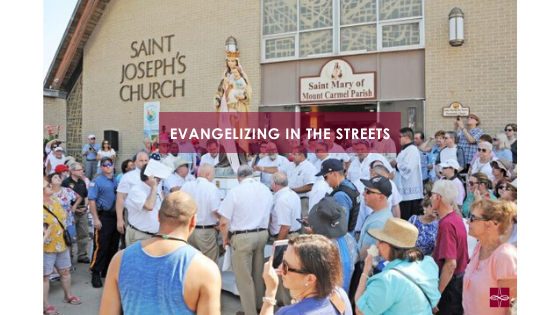
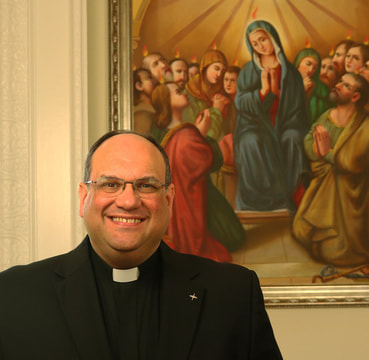


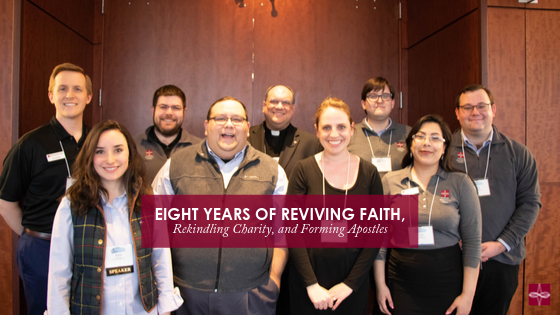


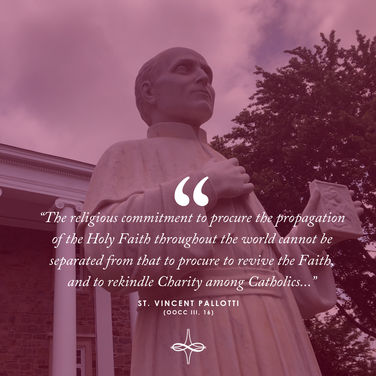
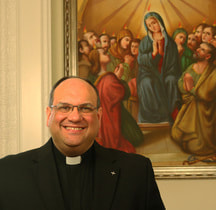
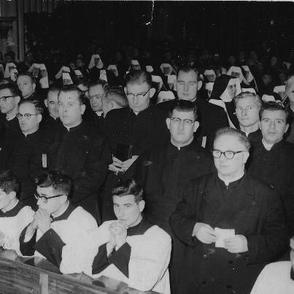


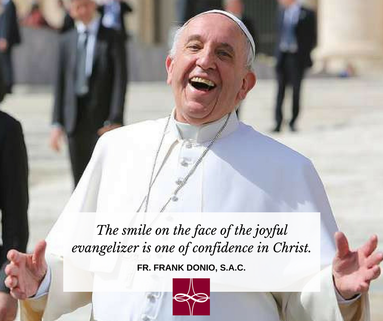
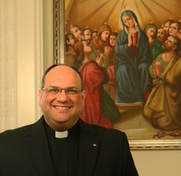
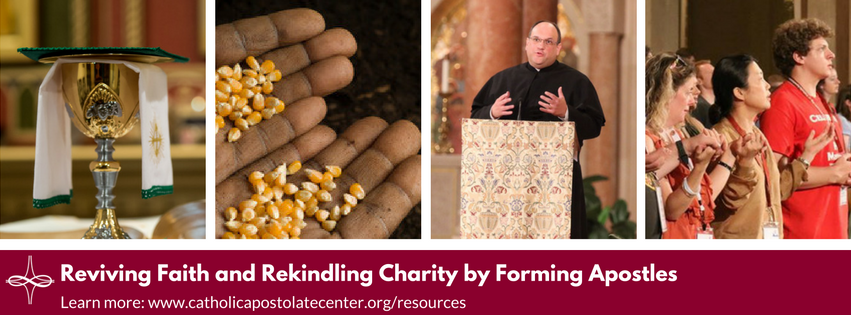
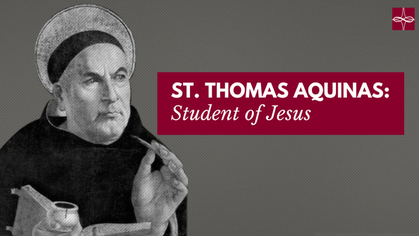

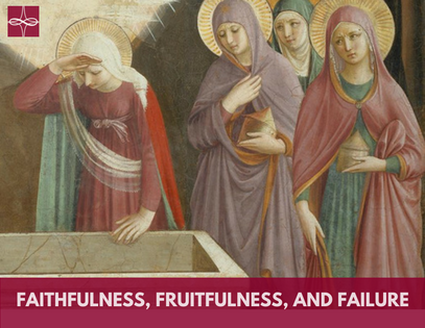

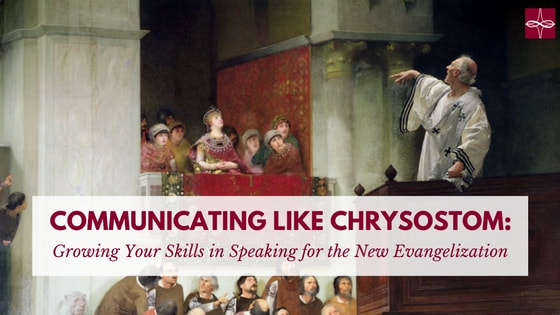

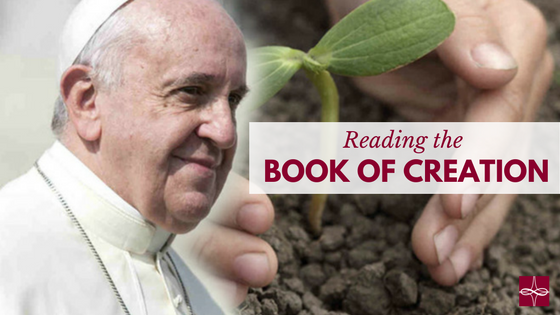
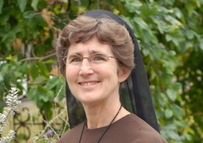
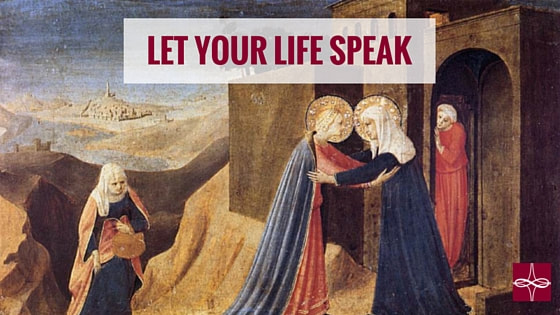
 RSS Feed
RSS Feed